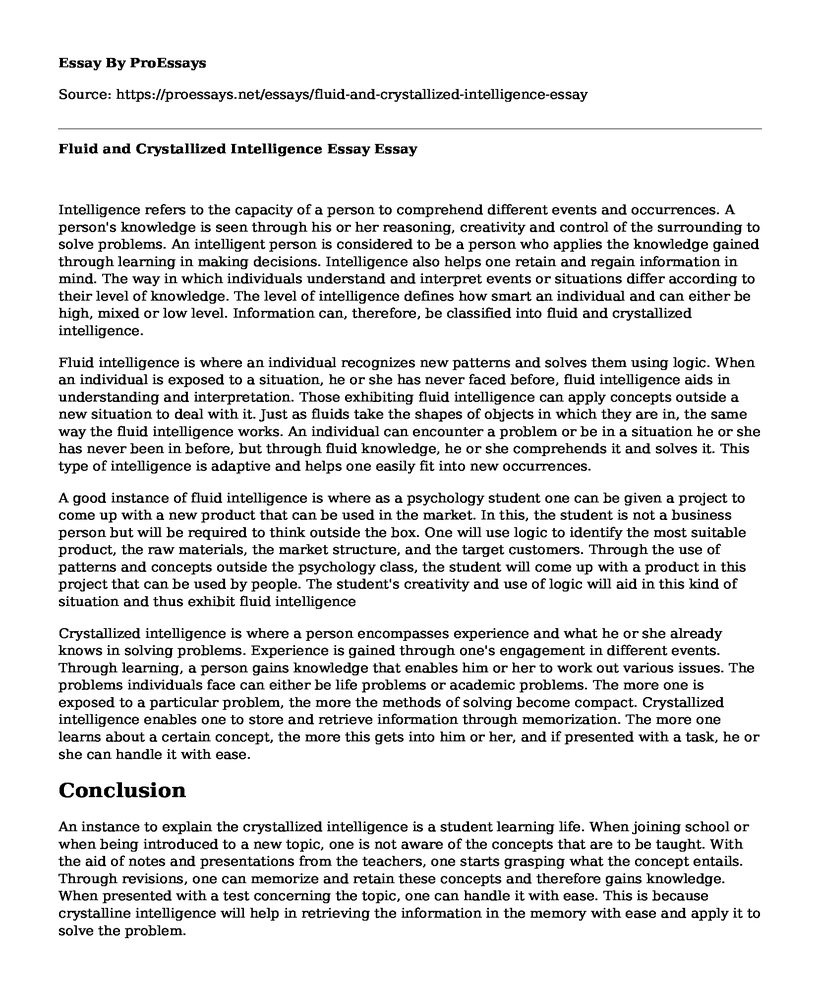Intelligence refers to the capacity of a person to comprehend different events and occurrences. A person's knowledge is seen through his or her reasoning, creativity and control of the surrounding to solve problems. An intelligent person is considered to be a person who applies the knowledge gained through learning in making decisions. Intelligence also helps one retain and regain information in mind. The way in which individuals understand and interpret events or situations differ according to their level of knowledge. The level of intelligence defines how smart an individual and can either be high, mixed or low level. Information can, therefore, be classified into fluid and crystallized intelligence.
Fluid intelligence is where an individual recognizes new patterns and solves them using logic. When an individual is exposed to a situation, he or she has never faced before, fluid intelligence aids in understanding and interpretation. Those exhibiting fluid intelligence can apply concepts outside a new situation to deal with it. Just as fluids take the shapes of objects in which they are in, the same way the fluid intelligence works. An individual can encounter a problem or be in a situation he or she has never been in before, but through fluid knowledge, he or she comprehends it and solves it. This type of intelligence is adaptive and helps one easily fit into new occurrences.
A good instance of fluid intelligence is where as a psychology student one can be given a project to come up with a new product that can be used in the market. In this, the student is not a business person but will be required to think outside the box. One will use logic to identify the most suitable product, the raw materials, the market structure, and the target customers. Through the use of patterns and concepts outside the psychology class, the student will come up with a product in this project that can be used by people. The student's creativity and use of logic will aid in this kind of situation and thus exhibit fluid intelligence
Crystallized intelligence is where a person encompasses experience and what he or she already knows in solving problems. Experience is gained through one's engagement in different events. Through learning, a person gains knowledge that enables him or her to work out various issues. The problems individuals face can either be life problems or academic problems. The more one is exposed to a particular problem, the more the methods of solving become compact. Crystallized intelligence enables one to store and retrieve information through memorization. The more one learns about a certain concept, the more this gets into him or her, and if presented with a task, he or she can handle it with ease.
Conclusion
An instance to explain the crystallized intelligence is a student learning life. When joining school or when being introduced to a new topic, one is not aware of the concepts that are to be taught. With the aid of notes and presentations from the teachers, one starts grasping what the concept entails. Through revisions, one can memorize and retain these concepts and therefore gains knowledge. When presented with a test concerning the topic, one can handle it with ease. This is because crystalline intelligence will help in retrieving the information in the memory with ease and apply it to solve the problem.
Cite this page
Fluid and Crystallized Intelligence Essay. (2022, Jun 30). Retrieved from https://proessays.net/essays/fluid-and-crystallized-intelligence-essay
If you are the original author of this essay and no longer wish to have it published on the ProEssays website, please click below to request its removal:
- Rhetorical Essay on Student Truancy
- Healthy Eating for the Older Population Paper Example
- How Implicit Personality Traits and Impression Management Affect Perception - Essay Sample
- Essay on Good Behaviors, Bad Behaviors: A Social Learning Theory Perspective
- My Struggle with Unhealthy Eating: A Story of Understanding and Change - Essay Sample
- Good Teacher, Good Learners: The Keys to Successful Teaching - Essay Sample
- Free Essay Sample on Teacher Efficacy & Student Self-Efficacy: Dialogical Approach for Effective Teaching







